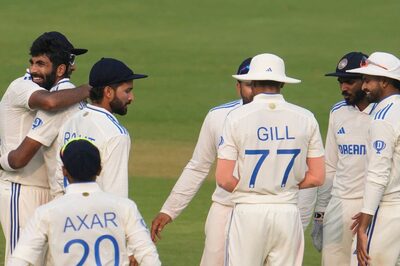
views
In a recent speech, Congress Vice President Rahul Gandhi said that India is not a nation, but a union of states. While saying this, he also referred to the Indian Constitution. As far as the constitution is concerned, it does describe India as a union of states. But, saying that India is not a nation is against the spirit of the constitution and the cultural heritage of this country. The Constitution of India says that India, that is, Bharat, will be a union of states. This makes it clear that this country is Bharat. As soon we call it Bharat, geography as well as the cultural heritage of thousands of years come to mind.
Describing the geography of India, Vishnu Purana says, “Uttaram yat samudrasya Himadreshchaiva dakshinam. Varsh Tad Bharatam Naam Bharati Yatr Santatih,” or, “the land which is situated to the north of the sea and to the south of the Himalayas is called Bharat Bhoomi, and the people residing on this holy land of Bharat are called Bhartiya.”
Not only this, Bharat is known as a nation not just because it is a landmass, but also because it is known that Bharat is one of the oldest and only living ancient civilisations of the world. Despite its diversity, there is a sense of unity in the culture here. It is an established fact that in India there are various sects, innumerable languages, dialects, costumes, castes, customs, and so on– yet our entire creation is based on unity since ancient times.
In Western countries, nationalism is defined on the basis of their language, sovereign state, geographical boundaries, will of the people, and so on. Western thinkers try to view nationalism on the basis of these criteria. However, we must note that the concept of nationalism is not very old in Europe. Different countries in Europe received nationhood at different times in history. That is, it can be said that nationalism was not there in the countries of Europe from earlier times. The kings and the statesmen contributed a lot in the process of building and polarising this nationalism.
In comparison, if we see, in India, the nationality of India was not based on any king, language or political regime. Many languages and dialects are spoken in our country. Many kings ruled in different parts of the country at different times. The entirety of India was not under the rule of any one sovereign for most of the time. Before independence, the uniform rules and regulations were never applicable in the country, yet India has always been considered a nation. Why is it that the nationalism of India has been intact for thousands of years, while the thinkers of the West and some of the thinkers of India, obsessed by western ideas, try to measure nationalism in India from the prism of the West’s half-baked concept of nationalism? This is despite the fact that nationalism in the West is relatively a new and narrow concept, which took shape only in the 15th and 16th centuries.
In such a situation, those who want to see the nationalism of India through the prism of the West, do not understand that India has always been a great nation. They think that nation means the existence of one state system (government), so though they recognise the nationalism of European countries like England, Germany, France, and others, but refuse to accept India as a nation. If seen, the spirit of nationalism in Europe started after the French revolution. But the irony is that the French Revolution, which was based on the principles of liberty, equality and fraternity, culminated in the rule of Napoleon and the reaction resulting from his expansionist invasions gave rise to nationalism in other European countries. It is true that Bismarck unified Germany, but German nationalism, in essence, was born as a reaction to Napoleon’s invasion. But it is absolutely true that the medieval West had not heard of nationalism or any such modern concepts.
European countries established their colonies by expelling the original inhabitants of different parts of the world like North America, Australia, and more, which had their own old cultures, but were divided into smaller states that conflicted among themselves. Nationalism developed spontaneously in these regions as well. But if seen, the concept of nationalism in all these countries is based on the governance system there. That is, it was thought that for considering a landmass a nation, the condition is that there should exist state machinery (a government).
That is why those people who are overwhelmed by the European concept of nationalism do not understand the nationalism of India. They are not able to appreciate that a country which has been considered as a nation even in the Puranas, written thousands of years ago; where there is a sense of unity in spite of the diversity of languages, dialects, customs, caste-creeds, worship systems; where for thousands of years people have been going on pilgrimages in all four directions of the country; where the national idea has always been present despite varying polities at different places. They feel that only after the arrival of the British Raj, a state system could be implemented in the country, so as a result, British rule is responsible for making India a nation.
But those people who have strong belief and conviction and rightly so, that in India, in spite of its diversity, there is a sense of unity among the people, which has its own cultural identity, heritage; and this unity is reflected in different ways, do not buy this view that ‘India is a nation in the making’ or India’s nationalism is indebted to the British rule. During the freedom struggle, many revolutionary heroes sacrificed their lives for the country, from every nook and corner, be it Bhagat Singh from Punjab, Rajguru from Maharashtra, or Chandrashekhar Azad from Madhya Pradesh. This was when heroes like Subramaniam Bharti from Tamil Nadu, shook the foundation of British rule with their revolutionary writings and songs and Orissa-born Subhash Chandra Bose challenged the British Empire by forming alliances at a global level. Failure to consider such a land as a nation, can’t just be called ignorance, but one can smell a conspiracy in this as well.
Shri Rahul Gandhi’s claim that India is not a nation also reminds of his proximity with some students of Jawaharlal Nehru University, presently facing criminal charges for their anti-national statements and sedition. It is no secret that slogans were raised at the Jawaharlal Nehru University saying India will be torn apart (Bharat tere tukde honge). These students facing allegations are not only having proximity with Shri Rahul Gandhi, but one of them was inducted in the Indian National Congress, and later he fought an election on a Congress ticket from Begusarai.
It seems that without understanding the implications of his statement, Mr. Rahul Gandhi has made this blunder under the influence of these separatist fringe elements. We must note that up until now, before independence and even after independence, no prominent Congress leader has said that India is not a nation. In such a situation, Shri Rahul Gandhi needs to be told about the dangerous implications of such statements by fellow politicians, thinkers and others. If Rahul Gandhi is not stopped, it may only help the designs of separatists who want to demolish the only living ancient civilisation of the world.
Ashwani Mahajan is the national co-convenor of Swadeshi Jagran Manch. The views expressed in this article are those of the author and do not represent the stand of this publication.
Read all the Latest Opinion News and Breaking News here


















Comments
0 comment